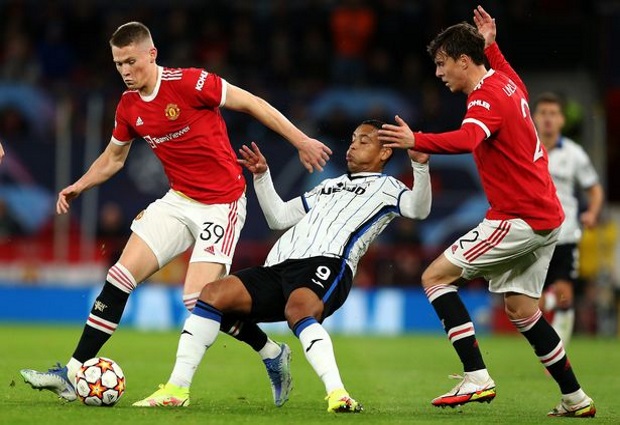Τhe new plan is no plan. Men standing, solemnly, in a place. Covering the spaces, and then the spaces in between the spaces. Block, buffer, deny everything. You didn’t get Harry Kane and you didn’t get Frenkie de Jong and you didn’t get Declan Rice, and so here you are: watching Jonny Evans punt long balls up the touchline in the hope – nay, the dream – that Antony can maybe get on the end of it and win a throw.
And for Manchester United there should be no shame or chagrin in any of this, in the jubilation of their fans in the Anfield Road Stand as the curtain fell on this grizzled and forgettable game. This is, quite frankly, a club that could use a little more of this kind of humility, a more realistic recognition of where they stand in the taxonomy of English football. Sir Alex Ferguson was in the stands here, and even his champion sides rarely regarded a point at Anfield as a bad point.
So if you’re Erik ten Hag, nursing a team sitting eighth in the Premier League with a goal difference of minus three and an injury list stretching to Altrincham, you simply take your medicine, accept the suffering, plod the path of most resistance. You lay out your two banks of four like a tarpaulin, squeeze and frustrate. And if there were times here when United looked like a team surviving rather than truly living, then perhaps it is because Ten Hag himself is a man in full-on survival mode, fighting for his project, fighting the vacuum that has sucked the five previous coaches before him into its vortex.
There were even chances, late on, for United to hit the jackpot. As the game opened out in the second half, United still periodically threatened on the counter, creating chances for Rasmus Højlund (there’s your problem) and Scott McTominay from distance (also: there’s your problem). Marcus Rashford came on in the closing minutes and did a passable impression of a man who knew how to score once. But for the most part it was gloriously grim, a masterclass in tactical pragmatism, a victory for nothing at all.
You could see it in the weird goal-kick routine, which involved Raphaël Varane tapping the ball sideways for André Onana to boot the ball as far as he could, a strategy that reaped no conceivable sporting advantage but did eat precious seconds out of the game. You could see it in the petty free-kicks and the hefty rugby-style punts to touch. You could see it in the way United basically gave up on pressing after about half an hour and simply dug themselves a trench.

Darwin Núñez, right, and Raphaël Varane battle for the ball at Anfield
It was a low block, pretty much a 4-4-2 out of possession, with Antony and Alejandro Garnacho effectively double full-backs and McTominay at the top of midfield. McTominay’s increasing importance to this United side since almost being sold in the summer has been one of the more curious subplots of this season: from expendable makeweight to handy midfield option to principal goal threat and now stand-in captain and – according to Ten Hag – “one of the examples of what it means to play for Manchester United”. And for all the pleasing symmetry of the personal redemption arc, it’s also possible to wonder how a club of United’s size and resources developed such a reliance on such a yeoman player. Whether – in other words – it’s McTominay who got big, or United who got small.
Behind him Sofyan Amrabat chased down loose balls without ever really threatening to win control of one, and the promising Kobbie Mainoo was assigned the role of snuffing out Liverpool counter-attacks by fair means or foul. For all its lack of sophistication as a defensive tactic, it worked pretty much perfectly. You can point to Liverpool’s 34 shots on goal, but few of those shots were of decent quality. And after a red-hot opening United quietened the Anfield roar, kept their shape, dragged Jürgen Klopp’s team down to their level.
The real question is whether United can – or even should – have anything more to offer than this. Many United fans and ex-players will argue that they need to show more ambition against weaker opponents, but where exactly are those weaker opponents? Where did billowing hubris get them against Brighton or Crystal Palace or Bournemouth or Copenhagen? Why should United approach their trip to West Ham next weekend any differently? Perhaps it is unfair to demand that a team in this state of permanent flux, so evidently short of Champions League standard, start playing sparkling Champions League football.
And so of course you can pin your hopes on that delicious Mainoo pass to Garnacho in the second half, and the injuries clearing up, and Højlund finally banging them in, and the Ineos takeover eventually going through. But right now you take your clean sheet and you are grateful for it. You fight for the present, because at Manchester United you learn soon enough that the future never comes.
















